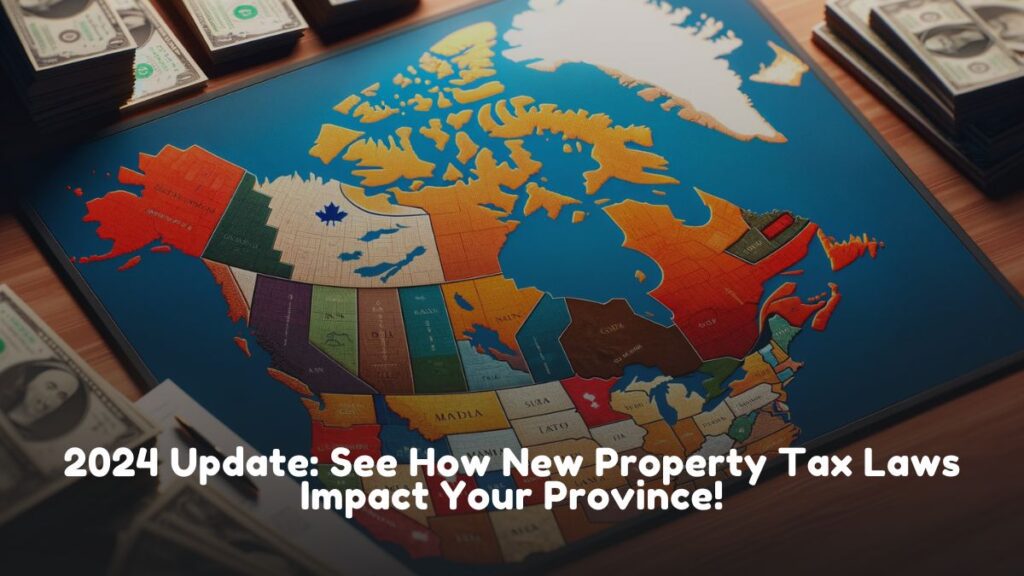Key Takeaways
- Canada Property Tax is a mandatory fee that property owners pay to their municipal or provincial government to fund public services and infrastructure.
- Property tax rates vary by province and municipality, depending on the assessed value of the property and the local funding needs.
- In 2024, four provinces in Canada are expected to see significant property tax increases: Ontario, British Columbia, Alberta, and New Brunswick.
- The main reasons for the property tax hikes are the budget shortfalls, the inflation pressures, the infrastructure needs, and the COVID-19 recovery plans of these provinces.
- Property owners can file their property taxes online or by paper, or hire a tax preparer to do it for them. They can also apply for tax credits and rebates to reduce their tax burden.

What is Canada Property Tax?
Property tax is a fee that property owners in Canada have to pay to their municipal or provincial government on a regular basis. The revenue from property taxes is used to finance essential community services and infrastructure, such as roads, sewers, schools, parks, fire stations, libraries, and more.
The amount of property tax that a property owner pays depends on two main factors: the assessed value of the property and the tax rate set by the local municipality¹.
The assessed value of the property is determined by a local or provincial assessment body, which considers the property’s size, age, location, and improvements. The assessed value may differ from the market value of the property, which is the price that the property could sell for in the current market conditions.
The tax rate is a percentage that the municipality applies to the assessed value of the property to calculate the property tax. The tax rate varies depending on the municipality and the type of property. The tax rate is often expressed in mills, which means one dollar of tax per one thousand dollars of assessed value.
The formula to calculate the property tax is:
Property Tax = Assessed Value x Tax Rate
For example, if a home in Toronto has an assessed value of $500,000 and the municipal tax rate is 0.599704%, the property tax for the year would be:
Property Tax = $500,000 x 0.00599704
Property Tax = $2,998.52
IMPORTANT LINKS:
- What Expenses Can You Deduct from Your Rental Income? (Updated 2024)
- How to Get Your EITC Refund Faster in 2024
- CPP, RRSP, TFSA, FHSA, AMT and OAS Changes: What You Need to Know for 2024
- What Happens to Your CPP and OAS Benefits When Your Spouse Dies?
- How to Get the Grocery Rebate Payments in Canada in January 2024
Province-wise Property Tax Rate Canada 2024
Property tax rates vary widely among provinces and municipalities in Canada. Each province has its own rules and methodologies for assessing property values and setting tax rates. Therefore, property taxes for similarly valued properties can differ significantly from one province to another.
Some of the factors that affect the property tax rates in different provinces are:
- Differences in Assessment Practices: Each province has its own property assessment body that is responsible for estimating the market value of properties. The methods and intervals at which these assessments are carried out can differ between provinces, leading to variations in assessed property values and property taxes.
- Provincial and Municipal Funding Needs: Property taxes are a major source of revenue for municipal governments, which use them to fund local services and infrastructure. The funding needs of different municipalities can vary depending on the size, population, and development of the community. Some municipalities may also receive transfers from the provincial or federal government to supplement their revenue. The funding needs and sources of different municipalities can affect the tax rates they set for their properties.
- Provincial and Municipal Policies and Priorities: Property taxes are also influenced by the policies and priorities of the provincial and municipal governments. For example, some provinces may have policies to limit or cap the property tax increases or to provide tax relief or rebates to certain groups of property owners. Some municipalities may have priorities to invest in certain areas or projects that require more funding. The policies and priorities of different governments can affect the tax rates they set for their properties.
The table below shows the residential property tax rates for some of the major cities in Canada for 2024, based on the information available from the municipal websites.
| City | Province | Residential Tax Rate (%) |
| Vancouver | British Columbia | 0.24683 |
| Victoria | British Columbia | 0.52035 |
| Calgary | Alberta | 0.63573 |
| Edmonton | Alberta | 0.86869 |
| Saskatoon | Saskatchewan | 0.86562 |
| Regina | Saskatchewan | 1.07445 |
| Winnipeg | Manitoba | 1.24871 |
| Toronto | Ontario | 0.599704 |
| Ottawa | Ontario | 1.06841 |
| Mississauga | Ontario | 0.82348 |
| Montreal | Quebec | 0.76720 |
| Quebec City | Quebec | 0.87780 |
| Halifax | Nova Scotia | 1.10850 |
| St. John’s | Newfoundland and Labrador | 0.73000 |
| Fredericton | New Brunswick | 1.42110 |
| Saint John | New Brunswick | 1.78500 |
How Much is Canada Property Tax Increased and for Whom?
In 2024, four provinces in Canada are expected to see significant property tax increases: Ontario, British Columbia, Alberta, and New Brunswick. The main reasons for the property tax hikes are the budget shortfalls, the inflation pressures, the infrastructure needs, and the COVID-19 recovery plans of these provinces.
Ontario
In Ontario, the provincial government has announced a 2.5% increase in the education portion of the property tax for 2024, which is the first increase since 2012. The education tax is collected by the municipalities on behalf of the province and is used to fund the public school system. The increase is expected to generate an additional $200 million for the province.
In addition, some of the major cities in Ontario are also proposing substantial property tax increases for 2024, mainly due to the financial challenges caused by the COVID-19 pandemic and the rising costs of delivering municipal services. For example:
- Toronto is proposing a 10.5% property tax increase, which includes a 9% increase for the city tax and a 1.5% increase for the city building fund, a levy that supports capital projects such as transit and housing. The increase is the largest since the city’s amalgamation in 1998 and is expected to generate an additional $380 million for the city. The average household in Toronto will pay $30 more per month in property taxes.
- Ottawa is proposing a 3% property tax increase, which is the same as the previous year. The increase is expected to generate an additional $52 million for the city. The average household in Ottawa will pay $9 more per month in property taxes.
- Mississauga is proposing a 2.9% property tax increase, which is slightly lower than the previous year. The increase is expected to generate an additional $28 million for the city. The average household in Mississauga will pay $7 more per month in property taxes.
British Columbia
In British Columbia, the provincial government has announced a new Underused Housing Tax, which will apply to residential properties that are vacant or underused for more than six months of the year. The tax is intended to encourage the owners of these properties to rent them out or sell them, and to increase the supply and affordability of housing in the province. The tax rate will be 1% of the assessed value of the property for 2024, and will increase to 2% for 2025 and subsequent years. The tax will apply to properties located in urban areas with a population of at least 5,000 and a population density of at least 150 persons per square kilometre. The tax will not apply to properties that are used as principal residences, vacation homes, or long-term rentals. The tax is expected to generate an additional $100 million for the province in 2024.
In addition, some of the major cities in British Columbia are also planning to increase their property taxes for 2024, mainly due to the inflation pressures and the infrastructure needs of these cities. For example:
- Vancouver is planning to increase its property taxes by 7.4%, which is the highest increase in a decade. The increase will cover the funding for all city services, the Vancouver Police Department, and the infrastructure renewal. The average household in Vancouver will pay $16 more per month in property taxes.
- Victoria is planning to increase its property taxes by 4.5%, which is slightly higher than the previous year. The increase will cover the funding for the city’s strategic plan, the climate action plan, and the COVID-19 recovery plan. The average household in Victoria will pay $9 more per month in property taxes.
Alberta
In Alberta, the provincial government has announced a 3.5% increase in the education portion of the property tax for 2024, which is the first increase since 2015. The education tax is collected by the municipalities on behalf of the province and is used to fund the public school system. The increase is expected to generate an additional $90 million for the province.
In addition, some of the major cities in Alberta are also facing significant property tax increases for 2024, mainly due to the budget shortfalls and the COVID-19 recovery plans of these cities. For example:
- Calgary is facing a 7.5% property tax increase, which is the highest increase in the city’s history. The increase is mainly driven by the need to cover the $62 million gap in the city’s budget, which resulted from the reduced revenue and increased costs due to the COVID-19 pandemic. The increase is also partly due to the provincial government’s decision to reduce the municipal funding and increase the education tax. The average household in Calgary will pay $20 more per month in property taxes.
- Edmonton is facing a 3.9% property tax increase, which is slightly lower than the previous year. The increase is mainly driven by the need to fund the city’s capital projects, such as the Valley Line LRT, the Yellowhead Trail, and the Blatchford redevelopment. The increase is also partly due to the provincial government’s decision to reduce the municipal funding and increase the education tax. The average household in Edmonton will pay $11 more per month in property taxes.
New Brunswick
In New Brunswick, the provincial government has announced a 2.2% increase in the property tax rate for 2024, which is the highest increase since 2017. The increase is expected to generate an additional $30 million for the province. The increase is mainly driven by the need to fund the province’s health care, education, and social services, which have been strained by the COVID-19 pandemic and the aging population.
In addition, some of the major cities in New Brunswick are also planning to increase their property taxes for 2024, mainly due to the inflation pressures and the infrastructure needs of these cities. For example:
- Fredericton is planning to increase its property taxes by 1.9%, which is the same as the previous year. The increase will cover the funding for the city’s strategic plan, the climate action plan, and the COVID-19 recovery plan. The average household in Fredericton will pay $4 more per month in property taxes.
- Saint John is planning to increase its property taxes by 2.9%, which is the highest increase in the city’s history. The increase will cover the funding for the city’s debt reduction, the pension plan, and the infrastructure renewal. The average household in Saint John will pay $8 more per month in property taxes.
Filing Property Tax in Canada
Property owners in Canada have to file their property taxes every year, usually by the end of June or the beginning of July, depending on the municipality. Property owners can file their property taxes online or by paper, or hire a tax preparer to do it for them. Property owners can also pay their property taxes in installments throughout the year, or in a lump sum at the end of the year.
Property owners can also apply for various tax credits and rebates to reduce their property tax burden. Some of the common tax credits and rebates are:
- Home Owner Grant: This is a provincial program that reduces the property tax for eligible homeowners in British Columbia, Ontario, and Manitoba. The grant amount varies depending on the province, the property value, and the homeowner’s age, disability, or veteran status.
- Property Tax Deferral Program: This is a provincial program that allows eligible homeowners in British Columbia, Alberta, and Ontario to defer paying their property taxes until they sell their home or die. The program is mainly for seniors, persons with disabilities, and families with children. The deferred taxes accrue interest at a low rate and are secured by a lien on the property.
- Property Tax Rebate Program: This is a provincial program that provides a partial or full rebate of the property tax for eligible homeowners in Nova Scotia, Newfoundland and Labrador, and Prince Edward Island. The rebate amount varies depending on the province, the property value, and the homeowner’s income, age, or disability.
Conclusion
Property tax is a mandatory fee that property owners in Canada have to pay to their municipal or provincial government to fund public services and infrastructure. Property tax rates vary by province and municipality, depending on the assessed value of the property and the local funding needs. In 2024, four provinces in Canada are expected to see significant property tax increases: Ontario, British Columbia, Alberta, and New Brunswick. The main reasons for the property tax hikes are the budget shortfalls, the inflation pressures, the infrastructure needs, and the COVID-19 recovery plans of these provinces. Property owners can file their property taxes online or by paper, or hire a tax preparer to do it for them. They can also apply for tax credits and rebates to reduce their tax burden.


